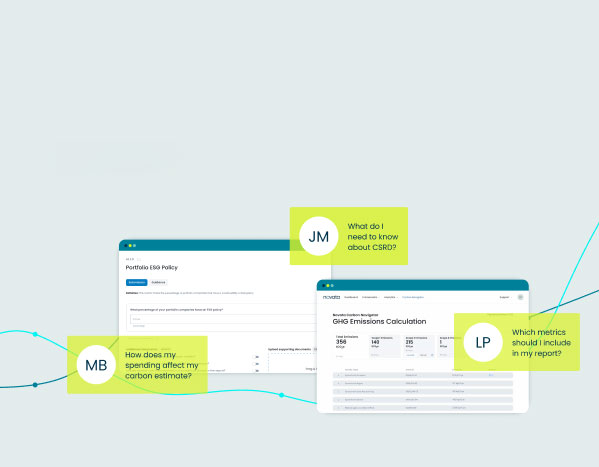Leading private equity firms are recognizing how ESG considerations are a powerful lever for organizational resilience and value creation. While implementing an ESG strategy is a great step in the right direction, it is not a one-off task. For firms to translate their ESG ambitions into tangible progress, continuously optimizing their ESG strategy is key to success.
To help private markets fine-tune their efforts, Novata recently hosted a webinar on the best practices for accelerating an ESG strategy, including optimizing ESG data management and metric selection. The session was moderated by Meredith Binder, Novata’s Chief Marketing Officer, and featured an expert panel consisting of Jessie Martin, Novata’s Head of Services and Caitlin Pentifallo, Novata’s Product Lead, Metrics and Guidance.
Read on to discover three key learnings from their conversation on developing and refining successful ESG strategy.
3 Considerations for Elevating an ESG Strategy
1. Align Metrics Selection to Business Value
Knowing what ESG metrics to measure is a foundational aspect of developing an ESG strategy, as it quantifies progress and enables firms to proactively manage risks and ESG performance. When it comes to defining and refining the metrics that matter, it’s important for investors to understand what is relevant in the pursuit of their ESG goals. Our panelists outlined two guiding principles:
- Begin with the end in mind: Frame metric selection through a big-picture perspective that encompasses current and future ESG objectives.
- Review data process and performance: Over time, evaluate data collection processes, data fill rates, and the quality of data received to support greater ESG performance.
Ideally, metric selection should contribute to tangible business value, such as being grounded in financial materiality or facilitating the development of new operating models.
In selecting metrics, panelists discussed the value of aligning to external standards. A recent Novata and Oliver Wyman report found that investors lean on a variety of sources to identify material metrics, including internal scorecards and existing frameworks and standards. The panelists noted that investors relying on custom or internal metrics may have to compromise when it comes to benchmarking performance against industry standards. Custom metrics are often based on smaller data pools or limited parameters, and may not accurately reflect benchmarks as compared to standard-aligned metrics.
2. Establish Best Practices and Processes for Quality Data Collection
Once there’s a clear understanding of what metrics are relevant, developing processes to collect data is a critical part of implementing an ESG strategy. Collecting data from portfolio companies remains a frustrating challenge for the private equity sector, with 89% citing limited data as a roadblock to meeting regulatory requirements.
To help improve engagement with portfolio companies and ensure they provide the necessary ESG information, the panelists recommended investors contextualize the why behind disclosure requests in a way that resonates with stakeholders. In this PwC survey, 69% of investors say that it’s important for companies to report the relevance of sustainability to the company’s business model. One way to do so is to align ESG performance as it relates to sustainable value creation, such as better market positioning, risk mitigation, or competitive differentiation.
Portfolio companies that are new to data collection may be burdened by the magnitude and complexity of these data demands as well. Novata’s Jessie recommends starting small with manageable steps, understanding how metrics fit within the strategy, and driving home the value of the data being collected to the portfolio company for further buy-in. This enables a smoother experience for both GPs and portfolio companies and is also an opportunity to ascertain any data gaps in the process.
3. Empowering ESG Teams Is Critical for Success
The industry has seen a rise in demand for ESG-focused talent. However, the panelists pointed out that a lack of senior management support can limit the effectiveness of ESG professionals as well as a firm’s ESG maturity and potential.
To be successful, implementing the firm’s ESG strategy shouldn’t rely on the efforts of a singular department; it instead should be an enterprise-wide initiative. “The best way to empower ESG teams is to just have their back. Have trust and confidence in their expertise that they are developing strategies that are aligned with your business goals,” Jessie shared.
For their part, ESG leaders within firms will need to engage with stakeholders internally and communicate the value of incorporating ESG within the firm and how it aligns with overall business objectives.
Optimize Your ESG Strategy with Novata
As regulations and standards evolve, so must a firm’s overall ESG strategy. Developing a successful ESG strategy is a time-intensive task that needs to start now.
Whether your organization is new to ESG or looking to refine metrics in preparation for the year ahead, Novata caters to firms at every stage of their ESG journey. Novata offers a technology platform paired with in-house expertise to help investors build the foundation for their data strategy and optimize for continued success.
For more insights on how data management and metric selection play a role in elevating your ESG strategy, download our eBook, “Turning ESG Data into a Competitive Edge for Private Equity.”






